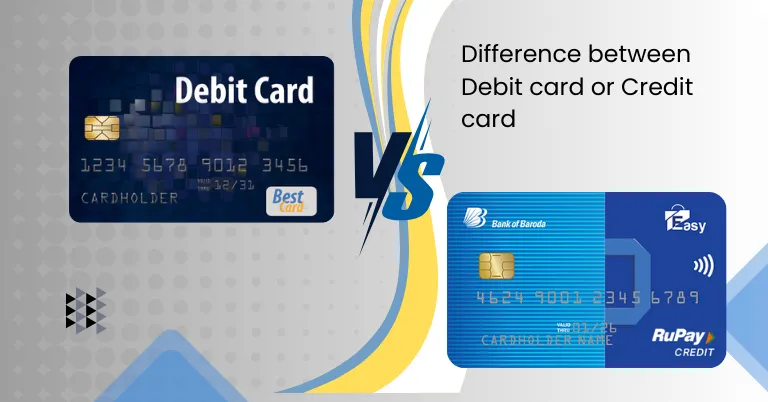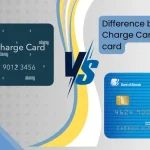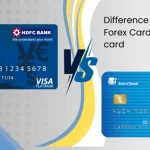Debit and credit cards are part of the most integral tools within modern financial transactions. They look alike, but their uses and effects are as differently varied. Once you learn from their differences, you will probably be better in your choices and handling when it comes to your finances. This guide will walk you through debit and credit cards, differences, and when one is more fit for your needs than another.
Here we are going to discuss about Debit Card vs Credit Card: What’s the Difference :-
How do Debit Cards work?
A debit card is linked directly to your checking or savings account, allowing you to spend and withdraw money you already have.
Using a Debit Card
The funds will be withdrawn from the linked account in a short period or even instantly when you use your debit card to make purchases or withdraw at an ATM. Debit cards require a personal identification number to carry out transactions on the ATMs or point-of-sale terminals, which makes them more secure. When carrying out online transactions, you’ll have to provide the verification code that is on the back.
Debit Card Networks
Most debit cards are on major payment networks like Visa or Mastercard, so most places accept them. Offline debit cards are not electronically linked to your account and function in a different way.
Benefits of Debit Cards
- Cost-effective: You can only spend what you have using debit cards; thus, you will never be overspending or paying interest charges.
- Ease of Access: You can apply them to various types of purchases-from e-commerce and in-store buys to just ATM withdrawals.
- No Impact on Credit: Debit cards never impact your credit score because you have no obligation to borrow funds at some point.
How Credit Cards Work ?
Credit cards, unlike debit cards, allow you to borrow money up to a certain amount of credit. Credit cards are given by banks after application during which your creditworthiness is tested.
Using a Credit Card
Credit cards offer a line of credit that can be used for purchases or cash advances. Unlike debit cards, the money doesn’t come directly from your bank account but from the credit card issuer. You’re expected to pay back the borrowed amount, either partially or in full, by the due date.
Interest and Fees of credit card
If you do not pay your balance in full within the grace period, credit cards start charging interest on outstanding balances. Cash advances also tend to have higher interest rates and transaction fees. Each and every bank has different fees and interest rates on their credit card. For example, Axis Bank credit cards offer different features than Bank of Baroda credit cards.
Credit Card Networks
Credit cards are also accepted on major networks such as Visa, Mastercard, or American Express, which ensures acceptance everywhere in the world. However, some store-branded credit cards can only be used at particular stores.
Benefits of Credit Cards
- Builds Credit History: Regular and timely repayments raise your credit score that serves as important foundations for future opportunities.
- Rewards and Benefits: Many credit cards provide cashback, miles of travelling, and reward points as rewards and benefits.
- Emergency Use: Credit cards rescue you when you do not have enough money in your checking account to pay for expenses.
- Consumer Protection: Debit cards have worse fraud protection than credit cards.
Key Differences Between Debit and Credit Cards: Debit Card vs Credit Card
1. Connection to Bank Account
- Debit Card: Directly linked to your checking or savings account.
- Credit Card: Connected to a line of credit issued by the bank.
2. Impact on Credit Score
- Debit Card: Does not affect your credit score at all as there is no borrowing involved.
- Credit Card: Helps and hurts your credit score based on how you pay back the loan.
3. Interest and Fees
- Debit Card: You do not pay interest because you are simply tapping your own money. But you may be charged with an overdraft fee in case you use more than what is available in your checking account.
- Credit Card: Interest accrues against any outstanding balances and you normally pay a fee to cash advance.
4. Consumer Protections
- Debit Card: Liability is relatively low for fraudulent transactions because you may lose the funds in your linked account, but only if fraud goes unnoticed for some time.
- Credit Card: Generally offers no liability on fraudulent transactions and has extensive consumer protection.
5. Rewards and Incentives
- Debit Card: Most debit cards have meager or even no reward schemes
- Credit Card: Many credit cards provide highly expansive rewards schemes, like cash backs, miles, and even discounted prices on some purchases.
When to Use a Debit Card
A debit card is very good for general daily spending control and ensures that you only spend what’s in your account. A debit card is ideal when:
- Budgeting: You’re limited to the amount in your account, so tracking and controlling spending is easy.
- Debt Free: Since debit cards require no loans, there is a risk of running up debt or having to pay interest.
- Daily Expenditure: Groceries, electricity, and other retail shops should be paid using a debit card.
When to Use a Credit Card
Use credit cards where there is a need for flexibility and benefits. These include;
- Improving Credit Score: Pay for purchases with your credit card and build a good credit record.
- Emergencies: A credit card serves as a lifeline at times when one is required to incur unplanned expenses.
- Large Purchases: Large costs may be paid over the period of time. The payments, however, should always be properly managed.
- Travel and Internet Purchases: Many credit cards also offer insurance for travels and fraud protection along with rewards on purchases.
ATM and Prepaid Debit Cards
ATM Cards
An ATM card is a debit card specifically designed for cash withdrawal from ATMs. It is not a debit card for any kind of purchase transaction.
Prepaid Debit Cards
It comes preloaded with a specific amount of money, serves like a debit card but does not link to any bank account. It is usually for gifting purposes or if the person intends to stick to a budget since the user only spends money that has been reloaded.
Making the Right Choice
There is a choice between a debit card and credit card which depends on the financial situation and set goals. Some factors to consider include;
Choose a Debit Card If:
- You prefer not to incur debt.
- You want a tool for daily budgeting and spending.
- You want an easy way to handle your money with no interest charges.
Choose a Credit Card If:
- You wish to build or rebuild your credit history.
- You want rewards, cash back, or travel perks.
- You can use your money to finance emergencies or a big purchase.
Conclusion
Different cards, different needs, and varied benefits: debit and credit cards. Debit cards to manage petty expenses without risking debts, and credit cards offer greater flexibility in financial management opportunities to build credits and earn rewards as well. You’ll be informed on how to use them both wisely according to your financial requirement and goals.
FAQs on Debit Card vs Credit Card
Q1. How Long Is the Grace Period on a Credit Card?
Ans. 21 days for most cards, which means that you owe no interest on that balance if you pay it by then.
Q2. What Is an Overdraft Fee?
Ans. An overdraft fee is the charge when you use your debit card and spend more than you have in your account. Most banks have overdraft protection, but it is often charged.
Q3. What Are Secured Credit Cards?
Ans. Secured credit cards have a required cash deposit, and people use this form of card mainly to construct or restore their credit.






